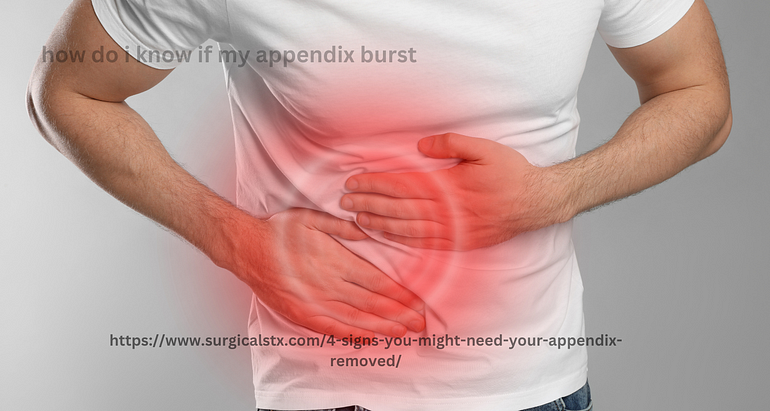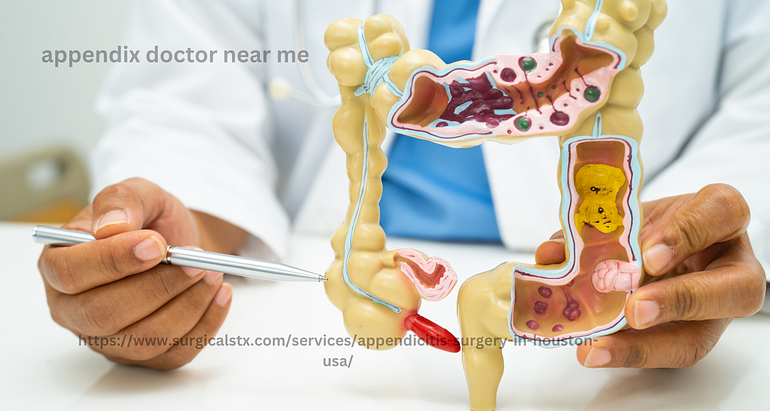A hernia occurs when an internal part of the body, usually part of the intestine or fatty tissue, pushes through a weakened area in the surrounding muscle or connective tissue. Hernias are common and can happen in various parts of the body, such as the abdomen, groin, and diaphragm. If you’ve been diagnosed with a hernia, you might wonder how do i know if my appendix burst if it’s possible for it to heal on its own without the need for surgery. In this blog, we’ll explore whether a hernia can heal without surgery, the treatment options available, and when it’s important to consult a hernia doctor in my area.

Can a Hernia Heal on Its Own?
The short answer is no—most hernias do not heal on their own. A hernia occurs when a section of an organ or tissue protrudes through a weak spot in the muscle or connective tissue. Once this happens, it’s unlikely that the tissue will spontaneously return to its proper place without medical intervention. While small hernias may cause minimal symptoms and remain stable for a while, they generally do not resolve without treatment.
However, that doesn’t mean you can’t manage a hernia without surgery right away. Some hernias may not require immediate surgical intervention and can be managed conservatively with lifestyle changes or other non-surgical options. In cases where surgery is needed, modern surgical techniques can make the recovery process faster and less invasive.
Non-Surgical Treatment Options for Hernias
While surgery is the most common treatment for hernias, there are some non-surgical approaches that may be used to manage mild hernias or delay the need for surgery. These approaches are typically used for hernias that aren’t causing significant pain or complications, and they’re more about managing symptoms than addressing the root cause.
1. Watchful Waiting
For small hernias that aren’t causing pain or other complications, a strategy called “watchful waiting” may be recommended. This involves closely monitoring the hernia for any changes, pain, or growth. During this time, your doctor may recommend lifestyle modifications to avoid strain on the hernia area. For example, avoiding heavy lifting, managing body appendix doctor near meweight, and avoiding constipation are helpful steps that can prevent worsening of the hernia.

While watchful waiting may seem like a good option for some, it’s important to understand that the hernia itself won’t heal, and there’s always a risk that it could get worse over time. If the hernia grows larger or begins to cause pain or other symptoms, surgical intervention may become necessary.
2. Supportive Garments (Hernia Belts)
For some types of hernias, such as inguinal hernias, wearing a supportive garment called a hernia belt can help manage symptoms. A hernia belt provides external support and helps reduce the bulging of tissue. It doesn’t repair the hernia itself, but it may alleviate discomfort, especially during physical activities like walking or lifting.
However, hernia belts are not a cure. They only provide temporary relief and are not a substitute for surgery. They can be used as a way to manage pain in cases where surgery is not immediately feasible or for patients who are waiting for surgery.
3. Lifestyle Changes and Weight Management
For people with abdominal hernias, losing excess weight can reduce the pressure on the weakened abdominal muscles and prevent further strain on the hernia. Maintaining a healthy body weight through proper diet and exercise can prevent the hernia from worsening.
Additionally, avoiding activities that put strain on the abdominal muscles, such as heavy lifting or intense physical exertion, can help reduce the risk of further damage. Staying away from constipation by eating fiber-rich foods and drinking plenty of water can also prevent strain during bowel movements, which can exacerbate a hernia.
4. Medications for Pain Management
While medications can’t heal a hernia, over-the-counter pain relievers like acetaminophen or ibuprofen can be used to manage discomfort associated with the condition. These medications can help ease pain and inflammation in the affected area, but they don’t address the underlying hernia.
If the pain becomes chronic or more severe, or if it is accompanied by other symptoms such as nausea or vomiting, it’s essential to consult with a hernia doctor in my area for further evaluation and potential treatment options.
When Is Surgery Necessary?
Surgery is typically recommended for hernias that are causing symptoms or posing a risk of complications. While some minor hernias may not need immediate surgical intervention, larger hernias or those causing pain or discomfort usually require repair. The two main types of surgical treatments for hernias are:
Open surgery: This involves making a larger incision near the hernia to push the tissue back into place and repair the hole or weak spot in the muscle. A mesh patch may be used to reinforce the area.
Laparoscopic (minimally invasive) surgery: This involves smaller incisions and the use of a camera and specialized tools to repair the hernia. Laparoscopic surgery typically offers a faster recovery time and less pain compared to open surgery.
Surgery is necessary if a hernia becomes incarcerated (trapped tissue that cannot be pushed back in), strangulated (blood supply to the trapped tissue is cut off), or if it causes significant pain, nausea, or other symptoms. These complications require immediate medical attention, and surgery will likely be the best course of action.
How Do I Know If My Appendix Burst?
Sometimes, hernia pain can feel similar to other abdominal hernia doctor in my area issues, such as appendicitis. If you’re experiencing severe abdominal pain, particularly in the lower right abdomen, you may wonder, “How do I know if my appendix burst?” A burst appendix is a medical emergency and usually presents with sudden, intense pain, fever, nausea, vomiting, and a tender abdomen. If you suspect that your appendix has burst, seek immediate medical attention. A appendix doctor near me can help with the diagnosis and treatment.

Conclusion
While most hernias do not heal on their own and will require medical intervention, non-surgical options like watchful waiting, lifestyle changes, and supportive garments can help manage mild cases. Surgery is the most effective and long-term solution for most hernias, especially those causing pain or complications. If you have a hernia or are experiencing symptoms like a bulge in your abdomen or groin, it’s important to consult with a hernia doctor in my area to determine the best treatment plan. In some cases, surgery may be necessary to repair the hernia and prevent further complications.